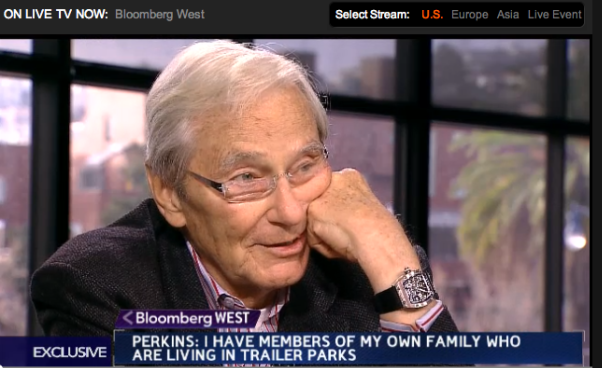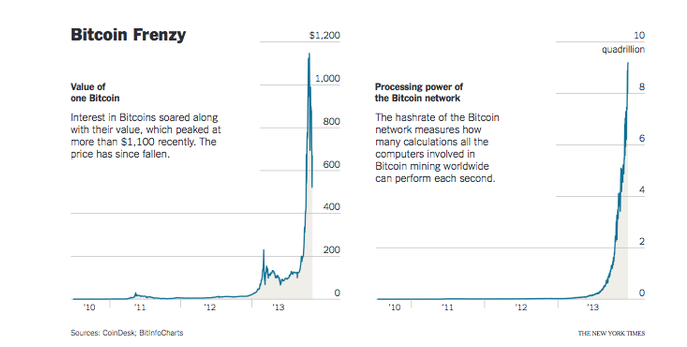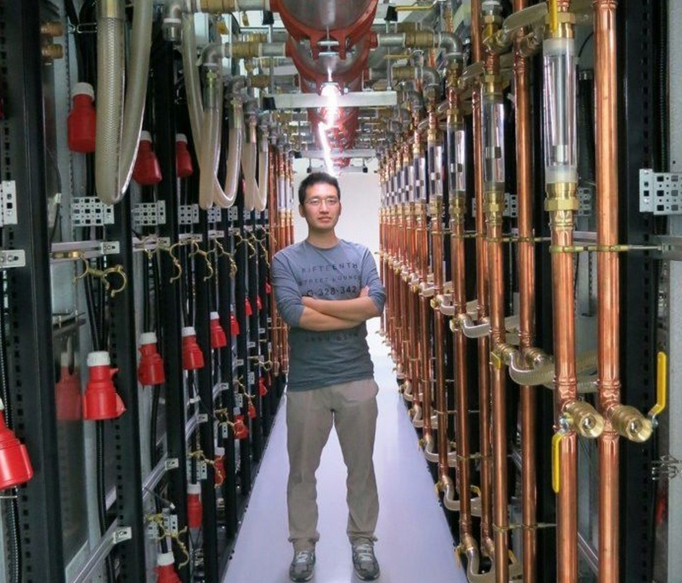Getting Away From It All
Silicon Valley's public image has been taking some body blows lately. The most shocking example of this was a series of statements by Thomas J. Perkins, a Valley venture capitalist. With a net worth northward of $8 billion, last month he had the audacity to compare the "persecution" (his term, not mine...) of America's 1% with the Nazi treatment of Jews prior to the Holocaust. That's sure one way to Godwin a conversation. ((As reported by the Wall Street Journal, he said: "I perceive a rising tide of hatred of the successful one percent" calling it "a very dangerous drift in our American thinking. Kristallnacht was unthinkable in 1930; is its descendant 'progressive' radicalism unthinkable now?")) Determined to dig the hole deeper, Perkins later gave a speech in San Francisco in which he suggested that the rich should get more votes than the poor. ((As he said, ""The Tom Perkins system is: You don't get to vote unless you pay a dollar of taxes...But what I really think is, it should be like a corporation. You pay a million dollars in taxes, you get a million votes. How's that?"))OK, maybe Perkins is just a tone-deaf idiot or his inflammatory statements are part of some larger anti-tax strategy being ginned up by the billionaire class. This interests me far less than the underlying message from Perkins - the über-rich of Silicon Valley are not just different from me and (probably) you but, to be honest, they would like to see less of us. And private jets just aren't enough anymore.
The most shocking example of this was a series of statements by Thomas J. Perkins, a Valley venture capitalist. With a net worth northward of $8 billion, last month he had the audacity to compare the "persecution" (his term, not mine...) of America's 1% with the Nazi treatment of Jews prior to the Holocaust. That's sure one way to Godwin a conversation. ((As reported by the Wall Street Journal, he said: "I perceive a rising tide of hatred of the successful one percent" calling it "a very dangerous drift in our American thinking. Kristallnacht was unthinkable in 1930; is its descendant 'progressive' radicalism unthinkable now?")) Determined to dig the hole deeper, Perkins later gave a speech in San Francisco in which he suggested that the rich should get more votes than the poor. ((As he said, ""The Tom Perkins system is: You don't get to vote unless you pay a dollar of taxes...But what I really think is, it should be like a corporation. You pay a million dollars in taxes, you get a million votes. How's that?"))OK, maybe Perkins is just a tone-deaf idiot or his inflammatory statements are part of some larger anti-tax strategy being ginned up by the billionaire class. This interests me far less than the underlying message from Perkins - the über-rich of Silicon Valley are not just different from me and (probably) you but, to be honest, they would like to see less of us. And private jets just aren't enough anymore. Commensurate with Perkins' statements is the rising tide of protests - as seen in this video - in San Francisco against the fleet of private buses run by Google, Facebook, Apple, et al.. The protester's basic gripe is simple - these buses use public roads and public bus stops yet the companies owning them don't contribute enough to the public transportation system. Underlying this, of course, are deeper resentments about rising rents, affordable housing, and so forth.However, like the statements by Perkins, the "Google bus" issues taps into a deeper issue - the Silicon Valley tech crowd would like to get away from it all. And that includes having less to do with everyone else who isn't part of their technological ecosystem.The surge of praise from the tech elite for Bitcoin is another reflection of this "get away from the huddled masses" attitude...and, in the process, let's abandon their decaying infrastructure, oppressive tax brackets. What Bitcoin offers is an escape hatch for some people - apparently including scam artists and drug dealers - to avoid the responsibility and social contract that comes with using traditional legal tenders.There are a host of things about Bitcoin that I find problematic. Sci-fi writer Charles Stross captured them in a fine blog post called "Why I want Bitcoin to die in a fire." First of all, as Stross and others have noted, a very real environmental cost goes into producing this virtual currency.
Commensurate with Perkins' statements is the rising tide of protests - as seen in this video - in San Francisco against the fleet of private buses run by Google, Facebook, Apple, et al.. The protester's basic gripe is simple - these buses use public roads and public bus stops yet the companies owning them don't contribute enough to the public transportation system. Underlying this, of course, are deeper resentments about rising rents, affordable housing, and so forth.However, like the statements by Perkins, the "Google bus" issues taps into a deeper issue - the Silicon Valley tech crowd would like to get away from it all. And that includes having less to do with everyone else who isn't part of their technological ecosystem.The surge of praise from the tech elite for Bitcoin is another reflection of this "get away from the huddled masses" attitude...and, in the process, let's abandon their decaying infrastructure, oppressive tax brackets. What Bitcoin offers is an escape hatch for some people - apparently including scam artists and drug dealers - to avoid the responsibility and social contract that comes with using traditional legal tenders.There are a host of things about Bitcoin that I find problematic. Sci-fi writer Charles Stross captured them in a fine blog post called "Why I want Bitcoin to die in a fire." First of all, as Stross and others have noted, a very real environmental cost goes into producing this virtual currency. Look at the graphs above. All that processing power needed to solve the Bitcoin algorithms uses an ever increasing amount of energy. Look down into the Bitcoin mine shaft...Stacks upon rows of energy-sucking servers and coolant systems. Bitcoin's virtuality is just an illusion.
Look at the graphs above. All that processing power needed to solve the Bitcoin algorithms uses an ever increasing amount of energy. Look down into the Bitcoin mine shaft...Stacks upon rows of energy-sucking servers and coolant systems. Bitcoin's virtuality is just an illusion. Besides the environmental aspects, - as Chinese regulators recently found out - Bitcoin offered a good way for investors to avoid taxes. And you know you have a problem when the Chinese government starts crying foul. Bitcoin has developed an especially strong appeal among Silicon Valley libertarians. As Stross (and Paul Krugman) have noted, libertarians like Bitcoin because it pushes the same buttons as their gold fetish" Don't like the Federal Reserve...here's your Bitcoin.But the most serious issue I have Google's city clogging buses or Bitcoin is how these signal a continued erosion of civil society. Each speaks to a violation of today's moral economy, the unshared rules and assumptions that have been tacitly agreed on and through which society functions.The most extreme example of this elite desire for flight, sublimation, and exclusivity might be the Seasteading movement.
Besides the environmental aspects, - as Chinese regulators recently found out - Bitcoin offered a good way for investors to avoid taxes. And you know you have a problem when the Chinese government starts crying foul. Bitcoin has developed an especially strong appeal among Silicon Valley libertarians. As Stross (and Paul Krugman) have noted, libertarians like Bitcoin because it pushes the same buttons as their gold fetish" Don't like the Federal Reserve...here's your Bitcoin.But the most serious issue I have Google's city clogging buses or Bitcoin is how these signal a continued erosion of civil society. Each speaks to a violation of today's moral economy, the unshared rules and assumptions that have been tacitly agreed on and through which society functions.The most extreme example of this elite desire for flight, sublimation, and exclusivity might be the Seasteading movement. The idea is simple - create a permanent dwelling at sea, outside of government's territorial claim. Once past those limits, all sorts of social and economic experimentation can happen. As the Seasteading Institute - based (where else?) in San Francisco - says on its web page, the goal is to "to enable seasteading communities – floating cities – which will allow the next generation of pioneers to peacefully test new ideas for government." Who is the leader of this group of wannabe escapists? Patri Friedman is chairman of Seasteading's board. The name? Yes, he's the grandson of free market guru Milton Friedman.Last summer's movie Elysium was just the sci-fi version of this "get me away from you" mentality. Whether it's Bitcoin, human-built islands of free enterprise floating in open waters, or roaming fleets of buses for techie riders, the message is clear - there is a group of powerful people who want to leave it all - and us - behind. It's really no surprise, I suppose. After all, when some of the most visible tech billionaires - Jeff Bezos, Elon Musk, Paul Allen, Richard Branson - have made their fortunes, what did they want to do? Start a private space company...and really get away from it all.
The idea is simple - create a permanent dwelling at sea, outside of government's territorial claim. Once past those limits, all sorts of social and economic experimentation can happen. As the Seasteading Institute - based (where else?) in San Francisco - says on its web page, the goal is to "to enable seasteading communities – floating cities – which will allow the next generation of pioneers to peacefully test new ideas for government." Who is the leader of this group of wannabe escapists? Patri Friedman is chairman of Seasteading's board. The name? Yes, he's the grandson of free market guru Milton Friedman.Last summer's movie Elysium was just the sci-fi version of this "get me away from you" mentality. Whether it's Bitcoin, human-built islands of free enterprise floating in open waters, or roaming fleets of buses for techie riders, the message is clear - there is a group of powerful people who want to leave it all - and us - behind. It's really no surprise, I suppose. After all, when some of the most visible tech billionaires - Jeff Bezos, Elon Musk, Paul Allen, Richard Branson - have made their fortunes, what did they want to do? Start a private space company...and really get away from it all.